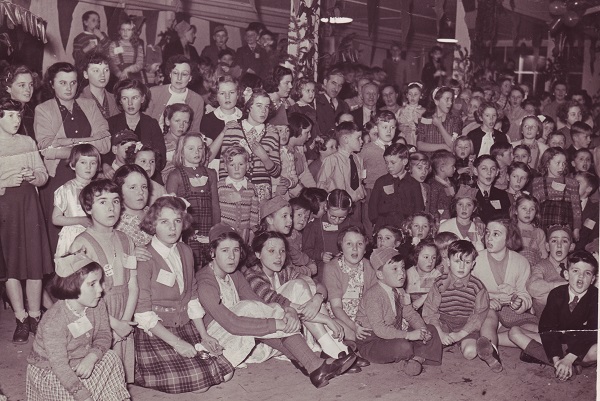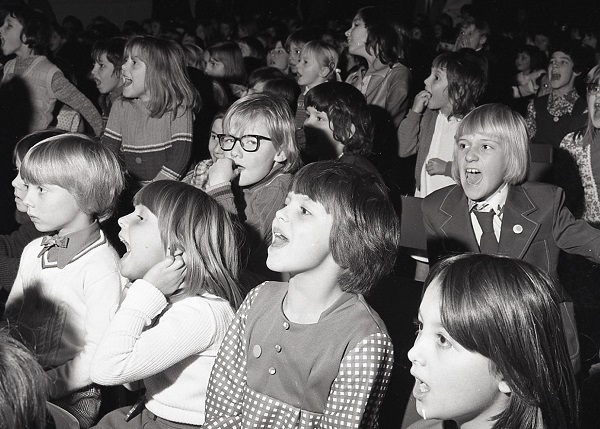AFTER Yate said goodbye to the last of its factory social clubs, Jackson’s, at the end of last month, the Voice republishes a history of the town’s clubs, and the company canteens they grew out of, written by David Hardill of Yate Heritage Centre:
The Jackson, Newman’s and ARC Social Clubs all emerged from the canteens of their respective factories during the mid to late-20th centuries.
Canteens were hugely significant in the lives of local people. Both Newman Industries and Parnall Aircraft factories expanded enormously in the late 1930s, and required more canteen space for the burgeoning factory population. The canteens also served as the nightclubs of their day, where major social events took place.
The heyday of the local canteen was undoubtedly the years between 1936 and 1941.
Staff numbers at Parnall’s began to rise immediately, from a handful in 1935 to over 3,000 at the beginning of World War II.

The earlier canteen catered for up to forty people, but the enlarged building of the 1940s could cater for up to 600 fish and chip lunches on a Friday.
For the general public, both Parnall and Newman canteens were hubs of entertainment. Both canteens offered a stage, tannoy and large space for events. On Fridays, following fish and chip lunches at Parnall’s canteen, there were workers’ concerts where talented singers, musicians and comedians within the workforce sought to maintain morale.
Workers Playtimes were live broadcasts from factory canteens, during and shortly after World War II. Both Parnall Aircraft Ltd and Newman Industries hosted these national events in the early years of the war.
The Entertainment National Service Association also paid a few visits to Parnall’s. ENSA were military concert parties visiting the armed forces and factories.
Memories of dances
With the arrival of the big factories, new dance venues emerged. Both Newman Industries and Parnall Aircraft staged major local dances at their canteens.
Phyllis Mellors, of Yate, recalled the dances. Many of the crowd there were servicemen, and it was ticket-only. There was nearly always a live band on, of different sizes and renown.
The tradition of canteen entertainment also emerged at Sodbury Quarry. By the 1970s, Sodbury quarry was one of very few sites nationally which could boast of a canteen and social club.
Initially, the canteen was rather rough and ready, with diners prone to get dirt on their trousers and dresses.
As the club grew in its scope, its fabric was improved. From the mid 1970s, club officials organised evening entertainment, bar and community events for its members until 2015.
‘The Captain’ of Neman’s social club
Harold Cheeseman was the sports and social secretary for the Newman’s social club from 1952 and 1975, and the tireless organiser of scores of events.
It is perhaps difficult now to comprehend how influential factories were in local people’s lives.
The Newman’s Club developed out of the factory canteen and, by the mid-1950s, boasted a boxing ring, darts boards, snooker tables and extensive bar and tables for socialising.
There was scope and space for dinner dances and a stage for bands to perform.
To the immediate north of the factory was Newman’s sport’s field, the scene of numerous club events, including legendary sports days.

Cheeseman, known as Captain from his military background, was the prime mover and shaker in organising the vast majority of events from the club’s inception to his death in 1975.
He was largely responsible for organising the children’s Christmas parties, sports days, bonfire nights and a myriad of different sports in the club, including major boxing and darts tournaments.
Cheeseman’s daughter Dorothy Brown confirmed that he was a workaholic.
Between 1952 and 1960, he combined his full-time personnel job at Newman’s with endless hours organising the wide range of club activities.

Cheeseman was also gregarious. As well as organising them, he was invariably at the events, overseeing proceedings and socialising with staff.
Newman Industries developed a reputation as a family firm, much of which can be attributed to Cheeseman. Such was his enthusiasm that he continued as club secretary and organiser beyond his retirement in 1960.
Although the club remained significant during the 1960s, the social scene began to fade as Cheeseman himself faded. He remained enthusiastic to the end, despite ill health, and was even typing minutes and notes in bed on an old typewriter.

Following his death in 1975 at the age of 81, the social club continued as a venue for Newman employees until the factory closed in 1988.
However, the halcyon days of Christmas parties and sports days were already a thing of the past by the time of Cheeseman’s sad demise.
Yate Heritage Centre is part of Yate Town Council
Closure of last factory social club marks end of an era for Yate
Top picture: Jackson’s Christmas Children’s Party, 1970s


